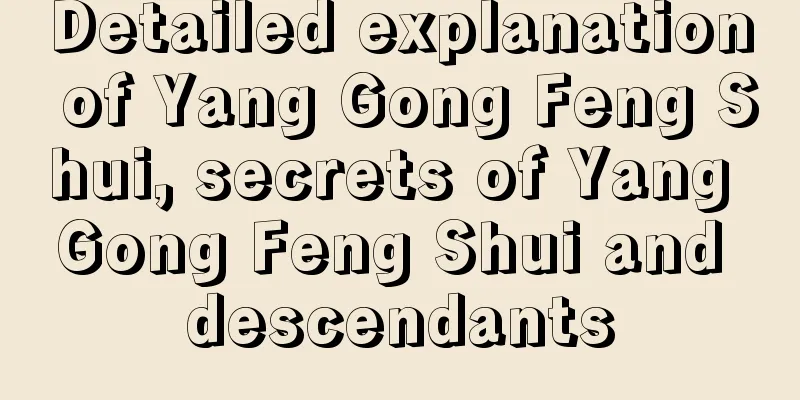Detailed explanation of Yang Gong Feng Shui, secrets of Yang Gong Feng Shui and descendants

|
Judging from the development of dynasties, there have been many people doing research on Feng Shui, because the kings and dignitaries of each dynasty all believed in Feng Shui. From noble kings to ordinary people, they all followed the Feng Shui evolved from the Book of Changes. Therefore, Feng Shui is a genuine science. It can be fully expressed with numbers, pictures and texts, and it also meets the standards of scientific and technological assessment in contemporary society. Today, Mr. Shui Mo will share with you the encyclopedia information about the founder of Feng Shui, Master Yang Gong, so that you can have a deep understanding of the founder of Feng Shui, Master Yang Gong, and better understand the historical roots of Chinese Feng Shui knowledge. 1. The founder of Feng Shui - Yang Gong Yang Gong's name was Yi, and his courtesy name was Yunsong. Yang Gong used Feng Shui to help people in need. His mythological stories have been widely circulated among the people for more than a thousand years, and he enjoys the good name of Yang who saves the poor. 2. The Legend of Yang Gong Xianshi Yang Gong is the most important inheritor and preacher of Feng Shui, the quintessence of Chinese culture that is deeply rooted in the hearts of the people. He is deeply loved by the general public and he is also a god. In 1939, in Xixiang Township, Hepingying, Chaoyang County, Guangdong Province, Mr. Yang Ruide received a message from Yang Yunsong and Liu Chunfang when he used a willow branch treasured in his home to divine. He was instructed to create a new religion, named Dejiao, to promote moral education and to inspire the people's will to drive out the Japanese invaders and rebuild their homeland under the difficult circumstances at that time. Yang Ruide traveled around to raise funds and finally established the first Taoist temple in his hometown. Later, according to God's will, the avenue was promoted overseas. Taoism has flourished in countries and regions with large Chinese populations, such as Thailand, Malaysia, Singapore and Hong Kong. According to statistics from previous years, 48 Purple Pavilions have been established in Thailand, more than 80 in Malaysia, more than 20 in Hong Kong, and ten in Singapore. In recent years, many Purple Pavilions have also been established in various parts of the country. Among them, there are two in Guangzhou, one in Shenzhen, one in Xinjiang, one in Beijing, and several in Chaoyang, Guangdong. There are also Taoist Purple Pavilions in the United States, Australia, and Japan. According to a friend in Singapore, the Chinese agency responsible for religious affairs sent an investigation team to Singapore a few years ago to investigate Taoism. The report they wrote concluded that Taoism is an orthodox religion whose purpose is to promote morality. During the May Day Golden Week in 2005, Tiantai County, Zhejiang Province, held a grand ceremony to consecrate the statue of Jigong in Jigong Living Buddha's hometown. The ceremony was hosted by the Thai Taoist Association and the Tiantai Buddhist Association. The Tiantai County Government held a grand banquet to welcome Jigong believers from various countries, and a grand welcome banquet was held in the Zhejiang Provincial People's Congress Hall. The date of this grand consecration ceremony was determined based on the message revealed by God two years ago. |
<<: What are the Feng Shui considerations for raising map fish, the best fish?
>>: How to look at the Feng Shui of a grave? What influence does Feng Shui have on grave sites?
Recommend
Can I get married on the fifth day of the second lunar month in 2019? Can I get engaged and hold a wedding?
Winter has gone and spring has come. February in ...
What should we eat during the Jingzhe solar term? Why should we eat pears?
There are different dietary customs during differe...
What is the date of the third day of the ninth lunar month in 2020 and what are the auspicious and inauspicious things in the lunar calendar?
What is the date of the third day of the ninth lu...
Is it okay to get the marriage certificate the day before the Autumnal Equinox in 2019? Analysis of agricultural proverbs about the Autumnal Equinox!
Introduction: Before getting the marriage certific...
Is April 25th of the lunar calendar 2019 a good day? Is today an auspicious day?
Introduction: There are 365 days in a year, and ea...
Can I get married on the fifth day of the tenth lunar month in 2017? Is it a good day to get a marriage certificate?
A gust of cold wind blows by, and we enter the ea...
What is the zodiac sign for people born on the tenth day of the eleventh lunar month in 2020?
What is the zodiac sign for people born on the ten...
When is the Spring Equinox in 2018? Spring Equinox customs?
Introduction: The Spring Equinox is one of the 24 ...
Is June 22, 2018 a good day to start a business? How auspicious or inauspicious is the time?
The opening of a new store is a major event in fol...
Is it a good time to move into new house during the Minor Cold in 2022? What is the hexagram for this day?
Lesser Cold, like Greater Cold, Lesser Heat, Great...
What is the date and time of Lesser Heat in 2019?
What is the date and time of Lesser Heat in 2019? ...
Is April 17th of the lunar calendar 2018 an auspicious day?
Why do people choose to hold happy events on an au...
Analysis of the fate of boys born on March 21st of the lunar calendar in 2022
The third month of the lunar calendar is tradition...
Is it advisable to take supplements on the Beginning of Winter? What is the best thing to eat on the Beginning of Winter?
Introduction: The arrival of the Beginning of Wint...
Is it a good idea to get engaged during Grain in Ear Festival 2018? What does Grain in Ear mean?
During the Grain in Ear season, the rainfall incre...









